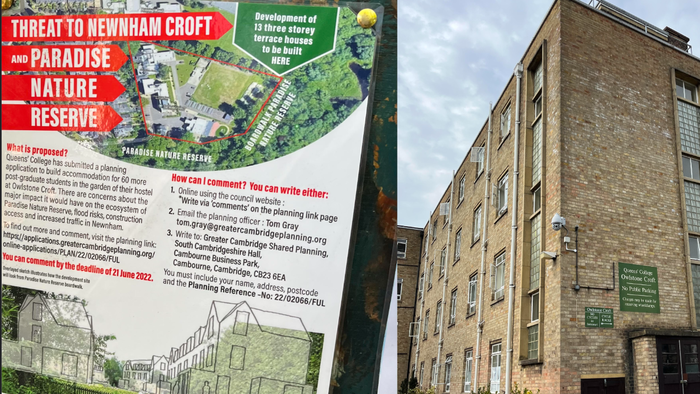Controversial local referendum approves neighbourhood plans
Proposals made by Queens’ College for further housing developments on Owlstone Croft have caused signficant dispute

A neighbourhood plan, which was recently passed in a local referendum, has introduced regulations which could affect future developments made to Queens’ College accommodation.
The South Newnham Neighbourhood Forum’s neighbourhood plan was approved in a referendum on January 16 by 63.5% of voters, with a turnout of 37.5% of registered voters.
The policies it includes must now be taken into consideration when planning decisions are made in the South Newnham neighbourhood; an area which encompasses Queens’ Owlstone Croft site. The site is currently home to some student accommodation, though the College plans to develop the site further.
While the approved regulations, which include requirements such as the use of “shielded white lights” for external lighting and the avoidance of the “severance of bat flight-lines,” cannot impact plans that have already been approved, they could make any future expansion and development more difficult. For example, development proposals in South Newnham must now “demonstrate measurable net gain for biodiversity” and “reduce and maintain low levels of light pollution”.
Proposals made by Queens’ for further housing development on the Owlstone Croft site have been a source of controversy for several years. The planned construction of four new accommodation blocks, housing 60 postgraduate students, which is due to commence this summer, has previously been opposed by both students and local residents.
In 2023, the College was granted permission for the development on appeal, after the plans were initially rejected by Cambridge City Council due to environmental concerns. However, local residents have continued to express concerns about the project’s impact on the nearby Paradise Nature Reserve.
Friends of Paradise Nature Reserve, a local environmental organisation, attempted to appeal the permission last year as part of a “final determined effort” to stop the plans.
Local councillor Jean Glasberg told Varsity that the approved neighbourhood plan was not explicitly aimed at stopping Queens’ further development at Owlstone Croft, though said the plan “might have prevented it” had it been implemented earlier.
She added that opposition to the Owlstone Croft development is not to “improvements to the existing building or indeed to additional accommodation on the site,” but rather to “the scale of what was proposed” and its proximity to “both the Nature Reserve and the school”.
Sarah Sharrock, a local resident, told Varsity: “Along with many of my neighbours, I am not trying to stop Queens’ developing the Owlstone Croft site.” Instead, she hopes that the College “will consider a compromise plan” which “doesn’t cause environmental damage to the city’s most biodiverse green space” or pose “significant safety issues” to the “thousands” of people who visit Paradise Nature Reserve every week.
In an email sent on January 7, Queens’ College Domestic Bursar Andrew Bainbridge encouraged eligible students to vote on the South Newnham neighbourhood plan. He also noted that the referendum fell outside of University term time, writing: “Despite my efforts to urge the City Council to move the date to within term time, they have not provided a response.”
Bainbridge told Varsity: “Sustainability has been a core priority throughout the planning and design process for Owlstone Croft,” adding that the College has secured funding from Salix Finance to support the decarbonisation of the site.
He continued: “Our long-term goal for Owlstone Croft is to create a sustainable College community that works in harmony with the neighbouring nature reserve,” explaining that the College has developed an “ambitious biodiversity strategy” which is being supported by the City Council Ecology Officer.
Bainbridge also stated: “As a responsible stakeholder in the local community, Queens’ will continue to engage with planning authorities and local groups to ensure any future developments align with the principles set out in the neighbourhood plan.” He also emphasised that the neighbourhood plan does not affect any of the College’s plans for development which have already been approved.
Regarding the timing of the referendum, he explained: “Given the referendum’s significance and the fact that it was scheduled outside of term time, we believed it was important to ensure eligible students were aware of their right to vote.”
 News / CUP announces funding scheme for under-represented academics19 December 2025
News / CUP announces funding scheme for under-represented academics19 December 2025 News / SU reluctantly registers controversial women’s soc18 December 2025
News / SU reluctantly registers controversial women’s soc18 December 2025 News / Cambridge welcomes UK rejoining the Erasmus scheme20 December 2025
News / Cambridge welcomes UK rejoining the Erasmus scheme20 December 2025 Features / Should I stay or should I go? Cambridge students and alumni reflect on how their memories stay with them15 December 2025
Features / Should I stay or should I go? Cambridge students and alumni reflect on how their memories stay with them15 December 2025 Film & TV / Timothée Chalamet and the era-fication of film marketing21 December 2025
Film & TV / Timothée Chalamet and the era-fication of film marketing21 December 2025










